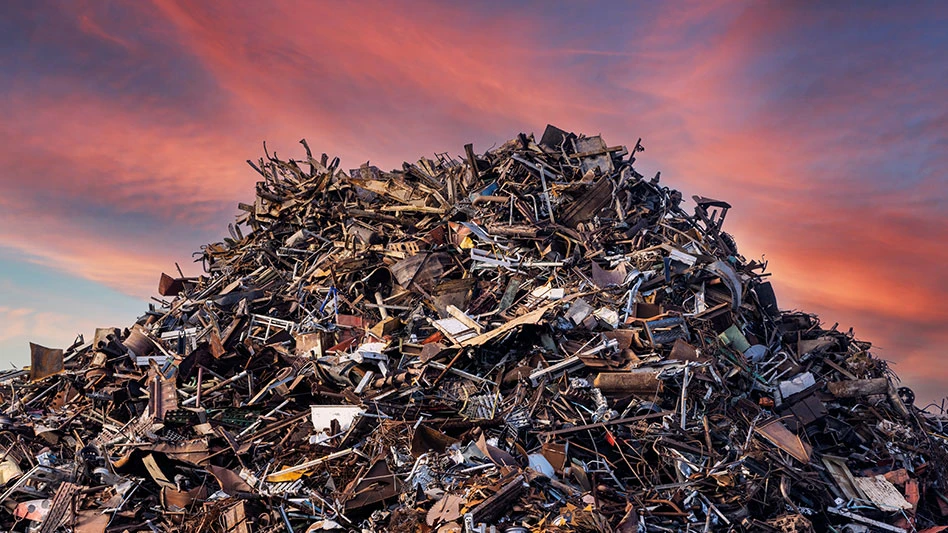IP EXPANDS DEINKING PLANT
International Paper has begun operation of the largest deinking facility of its kind at IP’s Riverdale plant in Selma, Ala.
The deinking facility will draw mixed office waste paper from a 500-mile radius of Selma, an area which includes Birmingham, Atlanta, Memphis and other metropolitan areas. Processing about 500 tons of sorted office paper daily, the facility will produce 400 tons of de-inked, recycled pulp per day.
"The Riverdale deinking plant will remove about 180,000 tons of solid waste from the landfills each year, saving taxpayers about $3.6 million annually," according to Wesley Smith, executive vice president of International Paper’s printing papers division.
The focal point of International Paper’s $300 million expansion is Riverdale 16, a papermaking machine designed to be the most state-of-the-art machine of its kind in the world. Scheduled for startup in May, the machine will be one of the nation’s largest users of recovered fibers for office papers.
The Riverdale 16 machine will produce about 360,000 tons of uncoated white papers per year or 260 billion 8 1/2 by 11 sheets each day to be marketed under the Hammermill Papers and Springhill brand names.
"Each day, Riverdale 16 will produce a continuous 30-foot-wide sheet of paper that will be long enough to stretch from Mobile, Ala., to New York City," says Smith.
At 32 1/2 feet wide, Riverdale 16 runs at top speed of 48 miles per hour. The machine is housed in a 315,000 square-foot facility.The new machine will help International Paper maintain a pace with the increasing demand for reprographic and printing papers, a market which continues to grow at a healthy six percent annually, says Smith.
"Consumer demand for International Paper’s reprographic paper is steadily growing, also," says Smith. "One out of every five sheets of office paper used in America is made by International Paper."
Through producing cut-size reprographics exclusively, Riverdale 16 will yield notable improvements in the physical makeup of the paper. "Because Riverdale 16 will manufacture one product and maintain longer runs for each grade, we will gain even higher consistency, an improved quality, increased uniformity and better appearance on each sheet," says Smith.
Riverdale 16’s production capacity will enhance just-in-time deliveries and one-day turnarounds for customer orders. "The expansion will double the size and number of truck docks and rail loading space," he adds.
DOMESTIC RECYCLING GROWTH TO CONTINUE
Significant gains in U.S. paper recycling remain the order of the day, according to the American Forest Paper Asociation’s latest capacity survey. The survey indicates that U.S. mill consumption of recovered paper surged 7.1 percent during the year, following a similarly strong 7-percent advance in 1993.
Recovered paper consumption by the U.S. paper industry has risen 52 percent since 1988, as compared with a 15-percent increase in paper and paperboard production. This lifted the recovered paper use rate -- recovered paper consumption as a percent of paper and paperboard production -- to an estimated 33.3 percent in 1994 from 25.2 percent in 1988, a 32-percent increase.
The survey projects that consumption of nearly every grade of recovered paper and paperboard will continue to increase by about 5.8 percent a year through 1997 -- about three times the anticipated capacity growth during the same period.
Corrugated is expected to post the fastest growth, according to survey data. U.S. mill consumption of corrugated will expand 7.5 percent a year from 1993 to 1997 and will account for 63 percent of overall recovered paper consumption growth during that period. Mixed papers will constitute the next fastest growing category, rising 5.8 percent annually through 1997 and accounting for 14.4 percent of the overall increase in recovered paper consumption.
MILLS HIKE NEWSPRINT PRICES
While demand has been strong for finished product, newsprint producers have indicated that greater demand will allow them to push through a number of price increases early this year.
Abitibi-Price announced in late January that it would raise its newsprint prices by 13 percent, effective in May. This would bring the price for newsprint to about $675 per metric ton. Following the A-P announcement, several other large North American newsprint producers followed suit, including Champion, Jefferson Smurfit and Bowater.
Most producers are raising prices by anywhere from $50 to $600 per metric ton this month. The increases compare favorably to last year, when newsprint was being sold at $411 per metric ton.
For paper stock dealers, higher prices are an indicator that demand for finished product remains strong. This anticipation of continued strong markets will promote steady movement of old news and old magazines to newspaper deinking facilities.
WELLMAN JOINS NAPCOR RANKS
Wellman Inc., the Shrewsbury, N.J.-based producer of polyester fiber and resin, has joined the National Association for Plastic Container Recovery, Charlotte, N.C.
A Fortune 500 company with a strong environmental background, Wellman is recognized as the world’s largest recycler of polyethylene terephthalate. The company has been manufacturing PET resin since 1993. Wellman’s recycled fibers are used in fiberfill, clothing and carpet. Its polyester, marketed nationally under the Fortrel brand name, is used in knits and wovens for apparel and home furnishings.
About 60 percent of Wellman’s worldwide fiber production is made from virgin materials, while the remaining 40 percent is made from recycled plastic materials.
Wellman has been recycling PET plastic soft drink bottles since 1978 and PET plastic bottles collected from curbside recycling programs since the late 1980s. The company annually recycles 2.4 billion post-consumer PET bottles in its U.S. operations, and recently introduced a fiber made from 100-percent recycled PET with the brand name Fortrel Ecospun.
NAPCOR is a not-for-profit trade association founded in 1987 to promote and facilitate the recycling of PET plastic. Wellman Inc. is the 16th company to join the association’s ranks, which now include:
Colgate-PolmoliveCo. Shell Chemical, Polyester Business
CONSTAR International Silgan Plastics Corp.
Containers Northwest Corp. Sonoco Products Co.
Continental PET Technologies Southeastern Container Inc.
Eastman Chemical Co., Polyester Business Wellman Inc.
Hoechst Celanese Corp. Western Container Corp.
ICI Americas Inc. Yoshino America Corp.
Johnson Controls Inc. Amoco Chemical Co. (associate member)
INSTITUTE ISSUES SCRAP TIRE REPORT
The Recycling Research Institute, Suffield, Conn., has published its seventh annual State Scrap Tire Management Programs Review. The 36-page booklet summarizes and highlights legislative, regulatory and market development activities in the 50 states.
"In sheer numbers, state commitment to managing and recycling scrap tires is significant," says Mary Sikora, publisher of the report. "Forty-eight states have shown they mean business by legislating tire recycling, regulatory and market development programs to spur an industry that is still young in many respects."
The report contains reviews of specific actions taken by the various states in 1994, along with information on the rules and permit requirements needed to start tire recycling, ways to access funding, what to consider when setting market priorities, where to find information on specific markets, and how to stimulate markets. The report is available for $28 from Recycling Research Institute, 133 Mountain Road, P.O. Box 714, Suffield, CT 06078.
PLASTICS RECYCLING TO GROWN BY 1998
The recycled plastics industry in the U.S. will continue to grow as a result of a proliferation of recycled content legislation, an expanding collection network, improvements in recycling technologies and further product applications development, according to a study by the Freedonia Group, a Cleveland-based industry research firm.
Demand for recycled plastics will expand 13 percent annually to 2.6 billion pounds in 1998, according to the study. The rising price of virgin resins will make recycled materials more competitive and contribute to growth. Packaging will remain the largest market for recycled resins based on consumer demands for environmentally-friendly packaging and more cost-effective technologies that allow closed-loop recycling in the food and beverage industries.
Plastics recycling will continue to promote increased collections, since further advances will be contingent upon establishing a dependable supply of materials and steady markets for recycled products. Individual state legislation requiring certain recycling rates by specific dates will spur growth. In addition, technological advances in sorting and processing will improve recycling efficiency and make recycled plastics’ pricing more competitive with virgin materials.
Demand for recycled PET is expected to grow more than 12 percent annually through 1998 as a result of increasing supplies and growing end uses, according to the study. PET’s main application, fiber and fiberfill, will find favorable opportunities in apparel and nonwovens, based on improved technologies. Demand for recycled HDPE will advance 15 percent annually due to a combination of expanded collection networks, legislation and diverse markets. However, concerns over contamination, unwanted colors or odors and reduced physical properties may threaten further advances. Packaging will remain the premier market for HDPE.
The use of recycled plastics in packaging will expand 14.6 percent annually over the forecast period due to legislative mandates and technology improvements. Fiber and fiberfill markets for recycled PET will increase nearly 12 percent annually through 1998, based on the development of 100-percent recycled polyester carpeting, apparel fibers and nonwoven geotextiles for soil stabilization and landfill lining.
OHIO EPA CONSIDERS SCRAP TIRE REGS
Faced with the same illegal tire disposal that plagues many other states, the Ohio Environmental Protection Agency has announced plans to develop rules for safe disposal of the material.
"We estimate there are over 100 million tires dumped either legally or illegally in Ohio right now," says Bob Large, Ohio EPA’s Scrap Tire Management Unit supervisor.
The agency will ensure scrap tires are kept apart from other materials, perhaps in special landfills, in order to prevent scrap tire fires. Another option would be to store the tires under water and recycle them as needed.
GREEN BAY FORMS BUYING DIVISION
Green Bay Packaging Inc., Green Bay, Wisc., has formed Bay Fibers Division, designated for procurement of recovered fiber. Plans call for Bay Fibers to assure an ongoing supply of secondary fibers for its mill operations and box plant customers.
"The Bay Fibers Division allows Green Bay Packaging to become a complete recycling resource to our box plant customers by recycling their wastepaper and scrap and closing the recycling loop," according to Russ Oettel, an executive with Bay Fiber.
The new division will buy all grades of secondary fibers, including old corrugated, double-lined cuttings and white office paper. The company emphasizes that its direct procurement of secondary fiber will not alter existing supplier relationships.
Bay Fibers will buy secondary fibers from suppliers in baled form only. Advantages to fiber suppliers of working directly with Bay Fibers Division include a steady and stable source of material, prompt payments, and fair market rates based on published index prices.
Jeff Walch, a spokesman for Bay Fibers, says the new division will help Green Bay Packaging establish a stronger presence in the paper recycling industry. "This will give us a chance to handle all grades," he adds. "Historically we have dealt with old corrugated and double-lined cuttings, and we are looking to expand that."
COKE RECYCLES IN SWISS MARKET
Coca-Cola has introduced a 25-percent recycled polyethylene terephthalate 2-liter bottle in its Swiss soft drink market.
The material for the bottle consists of three layers of PET plastic. The inner and outer layers are made of virgin PET, and the middle layer is made of recycled PET. Coca-Cola introduced the same bottle in Australia in 1993.
The new bottle meets all performance, quality and safety standards set by Swiss regulatory authorities. The Swiss health authority has approved the technology, with the cooperation of the Swiss Federal Laboratories for Material Testing Research.
Coca-Cola says it is planning further introductions and expansions in Europe in 1995, pending approval by governmental and regulatory authorities within the European Union.
CIWMB FIGHTS TIRE DISPOSAL
The California Integrated Waste Management Board, Sacramento, has launched a program designed to reduce the number of waste tires being illegally dumped statewide.
The program requires anyone hauling more than five tires to obtain a $10,000 operating bond and register as a waste tire hauler. The law also prohibits generators of waste tires from selling tires to a nonregistered hauler. Violators may be fined up to $10,000.
"Before this law took effect certain haulers would charge generators greatly reduced prices to haul waste tires and then illegally dispose them, undercutting responsible haulers who charged more to dispose tires properly," says board chairman Jesse Huff.
"This new program will help ensure that the more than 15 million tires not diverted don’t end up in ditches," he continues.
"This law should cause illegal disposal to drop and the number of tires being diverted for reuse to rise dramatically."
KRUEGER EARNS WISC. AWARD
Krueger International-Gillett Division, Madison, Wisc., has received the Wisconsin Department of Natural Resources monthly Prevention/Environment/Prosperity award.
The award was presented as a result of the company’s action to install a hazardous waste management system that will recover and recycle the company's used acetone.
COALITION LAUDS OIL SOAP BOTTLE
Colgate-Palmolive’s new Murphy liquid oil soap bottle with more than 25-percent post--consumer polypropylene breaks new ground for consumer product companies facing state recycling mandates, according to the Coex Coalition, a subgroup of the Society of the Plastics Industry that represents manufacturers and users of coextruded containers.
"Consumer packaging companies want to sell their products in all 50 states," notes Todd Van Gordon, environmental packaging manager at Colgate Palmolive and a member of Coex Coalition. "The new Murphy oil soap bottle is not just a least common denominator that satisfies recycling content laws. The new application of post-consumer recycled resin will stimulate recycling and keep packaging out of landfills."
The coalition encourages industry cooperation in the collection, recycling, reuse or other means of environmentally sound disposal of multi-layer packaging.
STONE & WEBSTER PLAN FALL STARTUP
Stone & Webster is planning test runs on its new office paper deinking facility in Auburn, Maine, by the middle of this year.
If the tests are successful, Stone & Webster plans to start manufacturing salable paper by the third quarter of this year. The deinking facility will consume a variety of office papers from throughout the Northeast, and may move as far west as the Chicago area to pull material, depending on market conditions.
James Rossi, a spokesman for the project, says that while the Northeast will be the primary draw for mill furnish, pulling from a wider area allows the facility to keep local prices more in balance.
LIBERTY PAPER MILL TO START BY MID-YEARLiberty Paper, a division of Liberty Diversified, reports that it is between four and six months ahead of schedule in the construction of its 100-percent recycled linerboard mill in Becker, Minn.
The start-up date for the $76 million facility is expected to be during the second quarter of this year.
The facility, about 40 miles from the Minneapolis/St. Paul area, will consume about 110,000 tons of old corrugated containers a year when fully operational.
STRIKES CURTAIL DEINKING PRODUCTION
Newstech Recycling, which has been recycling old news and old magazines into deinked pulp for sale to a number of mills, has seen its largest consumers closed by the strike.
Doug McLeod, head the purchasing department for Newstech, points out that two of the largest consuming mills, MacMillan Bloedel and Fletcher Challenge, are both on strike. The strikes at these two facilities has eliminated more than 90 percent of the demand for Newstech’s deinked groundwood pulp product.
Although the mills hope to have a contract settlement signed by press time, there are no indications that a resolution is imminent. In the meantime, McLeod points out that he has been buying roughly one-fourth of the usual amount of scrap paper he buys to run the mill. In addition, the mill is running only one shift a day.
VEGETABLES SERVE RECYCLING ROLE
Expanding the role of vegetables from mere nutritional supplements, researchers from the Pennsylvania State University, University Park, Pa., claim that minced horseradish root can clean up industrial wastewater containing phenols as well or better than chemical treatments that can cost millions of dollars.
Dr. Jean-Marc Bollag, co-director of Penn State’s Center for Bioremediation and Detoxification, and Jerzy Dec, research associate, say that although horseradish works best, minced potato can also remove phenols.
Phenols are a group of chemicals found in wastewater from steel and iron manufacturing, ore mining, paper bleaching, coal conversion, and the production of dyes, resins, plastics, pesticides, textiles and detergents. Many are considered toxic.
The horseradish root treatment takes only 30 minutes, according to the researchers, and the root can be reused up to 30 times. Appropriate disposal for the spent horseradish is being investigated.
AMNESTY DIVERTS SCRAP TIRES
An annual waste tire amnesty day in Ft. Wayne, Ind., last fall resulted in the collection and recycling of 18,210 tires -- an increase from the 16,026 tires collected in 1993.
Sponsored by the Allen County Solid Waste District, the cost of the program was 90 cents per tire.
Get curated news on YOUR industry.
Enter your email to receive our newsletters.
Explore the March 1995 Issue
Check out more from this issue and find your next story to read.
Latest from Recycling Today
- Altilium produces EV battery cells using recycled materials
- Brightmark enters subsidiaries of Indiana recycling facility into Chapter 11
- Freepoint Eco-Systems receives $50M loan for plastics recycling facility
- PET thermoform recycling the focus of new NAPCOR white paper
- Steel Dynamics cites favorable conditions in Q1
- Hydro starts up construction in Spain
- Green Cubes unveils forklift battery line
- Rebar association points to trade turmoil






